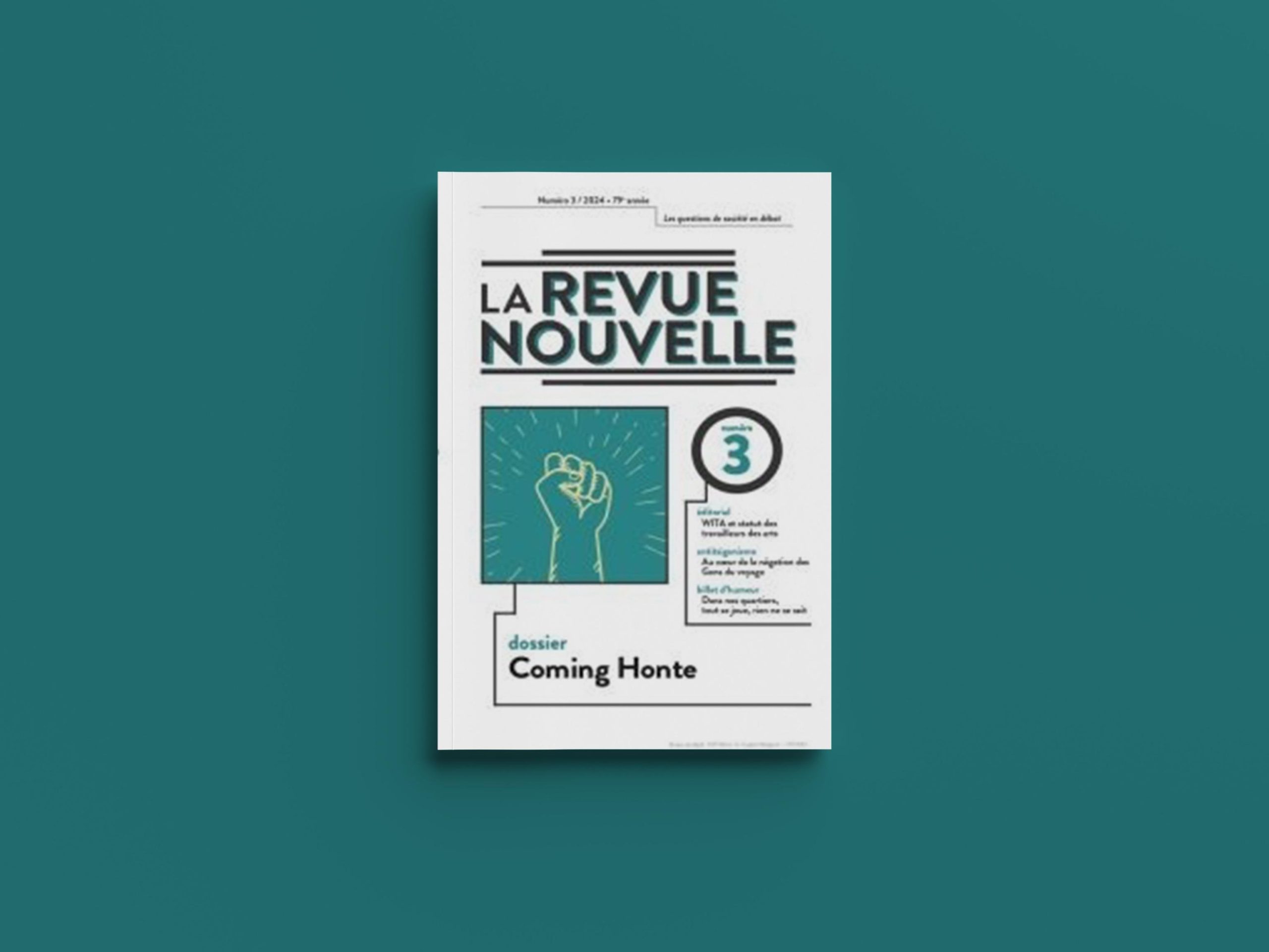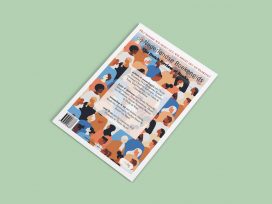Shame as political, historical and linguistic category: how shame came to be used to control women; why school is a place both of social mobility and social shame; and whether MeToo marked the end of shame as we knew it.
Shame has long been used to punish, silence, and maintain the status quo. But now, seven years after #MeToo began, it is also a force for change. La Revue nouvelle explores this ‘understudied, unloved emotion’, with texts tracing a history of shame, questioning its place in schools, literature, and sociolinguistics, and presenting stories and poems.
History of shame
Who is qualified, or entitled, to talk about shame? As victims of sexual abuse increasingly speak up, journalists turn to experts for comment on the testimony, ‘to give it context, to explain to the victim and the wider public what exactly she has been a victim of’. This ‘hierarchization of speech ultimately silences the victim’, writes historian Valérie Piette.

Since the nineteenth century, disciplines from literature to medicine have considered emotions a legitimate subject. But history has been a notable exception: conscious of ‘the right to forget’, the risk of reopening wounds, and the need to ‘produce distance’, it has trodden lightly.
In the nineteenth century, scientific and moralistic discourse linked shame to the body and sexuality, forging a tool to control women’s bodies and maintain the social order. Single women were cast ‘as both in danger and a danger to society’. In Belgium, institutions sprung up for unmarried mothers-to-be, where the ‘fruit of their shame’ could be hidden away and the ‘fallen’ women redeemed.
From medieval times through to the twentieth century, shame has been ‘part of the fabric of justice’ in France, with public humiliation doubling as punishment and deterrence. After liberation in 1944, women accused of collaboration horizontale had their heads shaved in public, ‘their bodies paying the price for France’s collaboration’.
For Piette, the history of shame is intertwined with that of rape. ‘For a long time, rapist and victim were jointly condemned’, the reputation of both stained. In France it took the arrival of second-wave feminism for women to proclaim that ‘the shame is over’. After a pivotal rape case in 1978 – the first to result in felony convictions – and the enactment of a legal definition of rape two years later, shame started to ‘change sides’.
Shame at school
Though schools are supposedly places of emancipation, this can come at a high price. For some young people, writes Marie-Christine Pollet, school is ‘where social shame emerges’ and where ‘a negative class conscience’ is formed as one confronts new social milieux and one’s family’s place in the social hierarchy. This juncture can enable young people to ascend socially, without suffering, on three conditions: they ‘authorize’ themselves to become something other than their parents; their parents accept this trajectory; and they ‘recognize the legitimacy of the history and practices of their parents’, even as they seek emancipation from them.
But if these conditions are not met, the ‘cleavage’ and ‘internal conflict’ can be devastating. Some try to erase all traces of their past and reinvent themselves. Some duplicate themselves to fit into two worlds, ‘using two accents … and obeying two alternative cultural codes’. Others split themselves in two.
Pollet highlights writers who explore these ruptures. The ‘autosociobiography’ of Annie Ernaux, an unflinching chronicler of shame, describes her experiences as a ‘class traitor’. Entering secondary school, ignorant of its codes, she discovers humiliation. She hates her parents for it, holding them responsible: ‘They have taught me nothing, it’s their fault people mock me … it’s their language that, despite my precautions, my barrier between school and home, eventually crosses over, slips into a piece of homework, an answer’. In this crucible, new relationships with school and language emerge.
Language and shame
Sociolinguistics explores relations of domination through language. Majority languages and language practices establish norms, and ‘transgressing or disregarding a norm’ makes us ‘feel shame before others’. But ‘assimilating the norms, we feel shame before ourselves’: linguistic ‘self-hatred’. For linguistic minorities, then, is shame inevitable?
Developed in the 1960s, writes Claudine Moïse, the concept of linguistic self-hatred reflects the struggles of decolonization, women’s liberation and civil rights movements in the US. It relies on ‘a radical unity of the minority group’ and the stigmatization of those who do not participate in its emancipation. It creates a ‘binary and exclusive categorization’ with resistance on one side and ‘acts of betrayal or disloyalty’ on the other. This simplification has obscured ‘individual attitudes’, including ‘forms of indifference’.
To ‘free the subject from guilt’, argues Moïse, sociolinguistics must adapt to the new historical and scientific paradigms. The twentieth century’s social struggles have been replaced by ‘the emergence of an autonomous subject’ whose ‘individual power to act is linked to their social conditions of existence’. The notion of shame must be rethought in this framework and new analytical methods developed.
Are we seeing the end of shame? Maybe not. But half a century after the feminist theorist Kate Millett declared that ‘the shame is over’, we have reached a watershed moment, a ‘public, collective affirmation of individuals’ shame’. In the #MeToo movement, shame is being vocalized and unpicked, reclaimed and repurposed, by people from all walks of life.

Published in cooperation with CAIRN International Edition, written by Cadenza Academic Translations.
Published 29 May 2024
Original in English
First published by Eurozine
© Eurozine
PDF/PRINTNewsletter
Subscribe to know what’s worth thinking about.
Related Articles

Breaking up the discourse
Dissenting voices of Islam on social media
Jihadist attacks have sent sporadic tremors through European societies for over 25 years. The ferocity of terrorist acts has also stunned Muslim communities. Now social networking provides a platform for dissenting Islamic voices critical of cultural and religious norms that fail to counter violent radicalisation or serve to indulge it.

On making commons concrete
The Dutch Review of Books 2/2021
‘The Dutch Review of Books’ presents: the commons, vying for legitimacy between state and capitalism; the void of societal responsibility for #MeToo; and African oral traditions evident in rap music.





